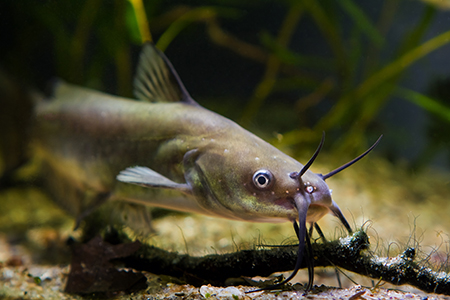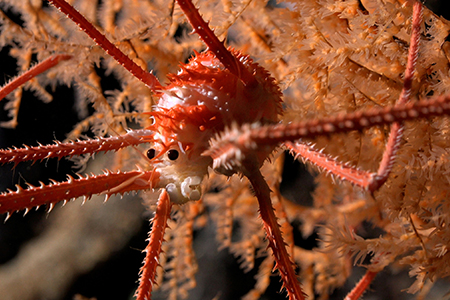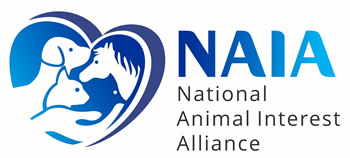
Inside This Issue:
- Yet More Exotic Animals Confiscated at Border, Rehabilitating at Gladys Porter Zoo
- Public Shelter Investigation Reveals Dead and Injured Animals, Vet Care Crisis
- Aquaculturists: Fill Out Yer Dang Census!
- Scads of New Species Discovered with Help of Deep Sea Robot
- Armed Theft of French Bulldog a Worrying Reminder of Growing Trend
- Taking Stressful Shelter Stays Out of Pet Rescue
Yet More Exotic Animals Confiscated at Border, Rehabilitating at Gladys Porter Zoo
The Gladys Porter Zoo in Brownsville, TX, is rehabilitating a group of exotic animals confiscated from wildlife traffickers. There continues to be demand all over the world for exotic pets, regardless of the legality. And unfortunately, in order to meet that demand, these animals are often harvested from the wild. All along the U.S.-Mexico border there are animals in need of help to keep them from being smuggled into the United States. USFWS and state agencies are looking to renovate their processes in order to accommodate the influx of trafficked animals, who are often delicate and in need of specialized care. This is a dire situation, but the animals are fortunate to have so many wildlife professionals working in zoos that can give them the attention they need and to help them either find homes here or be rewilded in their range countries.
Exotic animals seized during smuggling attempt in Brownsville
Resources
★ The Exotic Wildlife Trade Is Thriving in Texas
★ (2021) ‘Tape their beaks’: Wildlife trafficking case offers glimpse into clandestine animal trade from Mexico
Public Shelter Investigation Reveals Dead and Injured Animals, Vet Care Crisis
A video investigation of North Carolina’s public shelters revealed several instances of filthy conditions, disrepair, untreated injuries, animals without water, improper euthanasia procedures, and dead dogs and cats. The report was an example of how quickly difficult situations can become full-on disasters. In this case, the disaster caused by a perfect storm of increased surrenders meeting minimal staffing and veterinary resources.
The state’s Animal Welfare Director, Dr. Patricia Norris, brings up the skyrocketing cost of veterinary care and food as reasons the shelters are having so much difficulty caring for their animals, and she is sympathetic to their plight. It’s an extremely tough situation to be in! But she goes on to emphatically state “If you can’t provide the veterinary care for an animal, you either have to euthanize it or get it veterinary care, that’s it. You can’t allow an animal to suffer in a shelter,” which is a sad truth. Letting an animal with a fractured hip suffer for days in a strange place without hope of timely medical intervention is something people might do to avoid feeling bad about ending a life – but ultimately, it just prolongs that animal’s pain.
The state’s general assembly has allotted more funds for its shelters in the coming year, which will certainly be welcomed. But as always, it is difficult to successfully juggle resources, smart policy, and successful implementation – and serious problems inevitably take longer to solve than we hope.
Dead animals, broken legs and lack of vet care: WRAL Investigates taxpayer-run animal shelters
Resources
★ After Times investigation, L.A. County seeks to add kennels, review policies at animal shelters
★ Judge denies arrest warrant in Marlin Animal Shelter neglect investigation
Aquaculturists: Fill Out Yer Dang Census!

Smile: You're a Superstar
The National Aquaculture Association (NAA) plays a vital role in promoting the development and sustainability of the aquaculture industry in the United States, working to ensure a thriving and responsible seafood production sector. Friday, March 1st, is the deadline for an extremely important census within the industry called the Census of Aquaculture, which hasn’t been conducted in 6 years.
Since the NAA advocates for policies and regulations that support the growth and sustainability of the aquaculture industry, they are strongly encouraging US aquaculturists to fill out the census in order to garner more political support from Congress.
It’s simple: the more accurate the data, the better the industry can be understood and helped. Aquaculture is a much larger industry than one might think. It includes everything from fishing bait to alligators farmed for leather. It is a specialized trade that provides jobs all over the country. The NAA wants to strengthen aquaculture by driving innovation and growth in the industry through collaboration with government agencies, academic institutions, industry stakeholders, and non-governmental organizations. The updated census data will not only allow for members to receive access to resources, networking opportunities, and advocacy support for succeeding in the aquaculture business, it will address common challenges and opportunities facing the aquaculture sector.
NAA urges US aquaculture producers to stand up and be counted
Resources
★ 2023 Census of Aquaculture Submission Deadline Extended to March 1st!
★ What is aquaculture?
Scads of New Species Discovered with Help of Deep-Sea Robot

Hi there! Photo: ROV SuBastian / Schmidt Ocean Institute.
Mysteries of the deep have been discovered off the western coast of South America between Chile and Rapa Nui (Easter Island) with the help of a deep-sea robot that can descend over 2.5 miles below underwater. Underwater mountains, or seamounts, jutting upward from the depths of the Pacific plate are home to several new species scientists were not expecting to find. At this time, it looks like it will be more than 100 new species, but given the diversity of the depths, the final tally may be much higher.
Seamounts are created as uplifts from the famous Ring of Fire volcanic activity. Because of that activity, the waters are mineral rich and exhibit other ecosystems like hydrothermal vents and vast coral complexes. This area has been preserved by a UN treaty to protect it from overfishing and pollution - it lies in international waters not governed by any one country. This is one of many in a series of earmarked areas around the globe that must be conserved for the wealth of creatures that dwell within them.
See the dozens of new species this deep-sea robot just discovered
Resources
★ 10 mind-boggling deep sea discoveries in 2023
★ Discover 9 of the strangest deep sea creatures
Armed Theft of French Bulldog a Worrying Reminder of Growing Trend

Sometimes literally hot stuff.
You don’t need to be a dog person to know that French Bulldogs are ridiculously popular right now. They’re cute and playful, on the small side, and lower energy than many other popular breeds. This makes them ideal pals for a lot of American households. Their charm and practical desirability are further enhanced by their scarcity and price – if you want to get a Frenchie from a reputable breeder, expect a long wait time and to dig deep into your wallet.
Sadly, life for Frenchies isn’t just playtime, doggie treats, and belly rubs. This breed’s adulation comes with a seriously dark side, in the form of highly unethical, even violent people trying to cash in on their current popularity. A Texas dog trainer says she experienced just that earlier this week, after being robbed of her client’s Frenchie at gunpoint. If this sounds far-fetched or like a shocking one-off event, it’s not. The American Kennel Club lists Frenchies as the most stolen breed in the country, and these dogs have been at the center of numerous acts of theft, violence, and even death in recent years. Most famously, Lady Gaga’s dog walker was shot in the chest for his Frenchies (thankfully, the dog walker survived and all dogs were recovered) but there are countless other incidents that don’t make national headlines.
It is unfortunate we have to say this, but it’s not just Frenchies being stolen, and precautions to reduce the risk of pet theft are worth investigating and investing in. Of course, microchips, tags, and other forms of identification are valuable accessories our pets should already have. So is common sense regarding our surroundings. But it goes further than that. Even if it makes you feel a little goofy or paranoid, other steps, such as avoiding the same walk every day, noting unusual vehicles and activities, or installing home security features like locks and video cameras can be the difference makers that help you keep your pet.
French Bulldog 'Hugo' stolen at gunpoint from a San Antonio park, following nationwide trend
Resources
★ (Video) Elderly S.C. man shot to death during sale of French bulldog
★ Suspect in dog theft sues Lady Gaga over promised $500K reward for return
Taking Stressful Shelter Stays Out of Pet Rescue

If you're looking for a cat in New Jersey...
Created by Idaho’s Better Together Animal Alliance, the Home To Home website aims to keep surrendered pets out of shelters by taking shelter stays out of the rehoming process entirely. Think of it like a dating app, but for people who are unable to continue caring for their pets. How, exactly, does this work? Instead of dropping their dog or cat off at the local shelter, pet owners post a picture and profile of their animal, then field queries from interested parties. Oh, and there’s a catch: they can’t charge anybody a rehoming fee for taking the pet.
In theory, there are clear advantages to such a system. Less stress on shelter resources and no shelter stay for surrendered pets are major bonuses. Partnering shelters also offer at-cost spay/neuter services to pets in the network. Another advantage is that potential adopters can ask the surrendering party specific questions about the animal’s behavioral and medical history and expect a far more detailed response than many shelters can give. This allows for better filtering and matches in the adoption process – and hopefully, a permanent home.
Of course, the rosy scenario of the last paragraph assumes all parties involved are above board. Especially when it comes to behavior and health. Pet owners are notorious for minimizing their animals’ behavioral issues. Many of us are also quick to normalize and downplay the financial and emotional tolls associated with issues like chronic illness. The website boasts a disclaimer for adopters letting them know it’s their responsibility to verify things like bite and medical history, but, well… good luck with that.
In the article we shared, most of the concern over Home To Home was about pet owners trying to charge users for a pet. But what about the people who want to adopt a “free pet?” If you’ve ever used a dating app or posted an ad on Craisglist, you already know that they are havens for scammers other shady characters. And we certainly don’t need to rehash the countless reasons why “free” can be a bad idea when placing a pet (Google is free). But all other ethical and humane concerns aside, you have to ask: if someone is using this service because they can’t afford a rehoming fee, how will they be able to care for their new pet month after month? The community relations manager of a partnering shelter said “Charging a fee doesn’t lead to better homes, communication does,” and yes, communication is vital. But good communication won’t pay the electrical bill; if you can’t afford to keep a pet in your home, it’s kind of a moot point.
Private, no-cost pet adoptions between family, friends, and neighbors have been around for as long as people have kept pets; there are countless examples of pets being spared a trip to the shelter and enjoying the rest of their life in a new home. Tools like Home To Home that allow these sort of exchanges to occur on a much larger, though less intimate scale, certainly deserve scrutiny and skepticism, but as with any good tool, its potential to solve problems – in this case, for people and pets – comes down to a matter of responsibility and proper application.
The website that bypasses animal shelters to find pets a new home
Resources
★ Home To Home
★ Better Together Animal Alliance
Also in the News...
★ About 70 animals, including "Neo" the alligator, killed in fire at Nate's Reptile Rescue (Tragic Loss with Few Survivors; Most Deaths from Smoke Inhalation)
★ Wild Bill: Long at Odds With Vermont’s Fish and Wildlife Board, Activists Would Like to Strip Its Powers (Hens in the Foxhouse)
★ Houston Mayor John Whitmire introduces new initiative at 'State of Animal Welfare' address (Stray Animals & Public Safety)
★ Strange animals called pyrosomes are thriving as the Pacific heats up (Ominous Ocean Sausages)
★ This Tiny Fish Can Produce Sounds That Are As Loud As A Firecracker (Danionella cerebrum; Big Bada Boom)
★ Adventure Aquarium reports arrival of three little blue penguin chicks (Bananas Foster, Kiwi, and TBD)
★ Why some animals have evolved a sense of humour (Corny Canines; Playful Primates; Are You Calling Me Funny?)
★ These creatures of the 'twilight zone' are vital to our oceans (Murky Listings; Great Reading & Photos)
Click here to see what is happening legislatively



